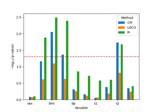hidimstat.LOCO#
- class hidimstat.LOCO(estimator, loss: callable = <function root_mean_squared_error>, method: str = 'predict', n_jobs: int = 1)[source]#
Bases:
BasePerturbation- __init__(estimator, loss: callable = <function root_mean_squared_error>, method: str = 'predict', n_jobs: int = 1)[source]#
Leave-One-Covariate-Out (LOCO) as presented in Williamson et al.[1]. The model is re-fitted for each variable/ group of variables. The importance is then computed as the difference between the loss of the full model and the loss of the model without the variable/group.
- Parameters:
- estimatorsklearn compatible estimator, optional
The estimator to use for the prediction.
- losscallable, default=root_mean_squared_error
The loss function to use when comparing the perturbed model to the full model.
- methodstr, default=”predict”
The method to use for the prediction. This determines the predictions passed to the loss function. Supported methods are “predict”, “predict_proba”, “decision_function”, “transform”.
- n_jobsint, default=1
The number of jobs to run in parallel. Parallelization is done over the variables or groups of variables.
References
- fit(X, y, groups=None)[source]#
Fit a model after removing each covariate/group of covariates.
- Parameters:
- Xarray-like of shape (n_samples, n_features)
The training input samples.
- yarray-like of shape (n_samples,)
The target values.
- groupsdict, default=None
A dictionary where the keys are the group names and the values are the indices of the covariates in each group.
- Returns:
- selfobject
Returns the instance itself.
- get_metadata_routing()[source]#
Get metadata routing of this object.
Please check User Guide on how the routing mechanism works.
- Returns:
- routingMetadataRequest
A
MetadataRequestencapsulating routing information.
- get_params(deep=True)[source]#
Get parameters for this estimator.
- Parameters:
- deepbool, default=True
If True, will return the parameters for this estimator and contained subobjects that are estimators.
- Returns:
- paramsdict
Parameter names mapped to their values.
- predict(X)[source]#
Compute the predictions after perturbation of the data for each group of variables.
- Parameters:
- X: array-like of shape (n_samples, n_features)
The input samples.
- Returns:
- out: array-like of shape (n_groups, n_permutations, n_samples)
The predictions after perturbation of the data for each group of variables.
- score(X, y)[source]#
Compute the importance scores for each group of covariates.
- Parameters:
- X: array-like of shape (n_samples, n_features)
The input samples.
- y: array-like of shape (n_samples,)
The target values.
- Returns:
- out_dict: dict
A dictionary containing the following keys: - ‘loss_reference’: the loss of the model with the original data. - ‘loss’: a dictionary containing the loss of the perturbed model for each group. - ‘importance’: the importance scores for each group.
- set_fit_request(*, groups: bool | None | str = '$UNCHANGED$') LOCO[source]#
Request metadata passed to the
fitmethod.Note that this method is only relevant if
enable_metadata_routing=True(seesklearn.set_config()). Please see User Guide on how the routing mechanism works.The options for each parameter are:
True: metadata is requested, and passed tofitif provided. The request is ignored if metadata is not provided.False: metadata is not requested and the meta-estimator will not pass it tofit.None: metadata is not requested, and the meta-estimator will raise an error if the user provides it.str: metadata should be passed to the meta-estimator with this given alias instead of the original name.
The default (
sklearn.utils.metadata_routing.UNCHANGED) retains the existing request. This allows you to change the request for some parameters and not others.Added in version 1.3.
Note
This method is only relevant if this estimator is used as a sub-estimator of a meta-estimator, e.g. used inside a
Pipeline. Otherwise it has no effect.- Parameters:
- groupsstr, True, False, or None, default=sklearn.utils.metadata_routing.UNCHANGED
Metadata routing for
groupsparameter infit.
- Returns:
- selfobject
The updated object.
- set_params(**params)[source]#
Set the parameters of this estimator.
The method works on simple estimators as well as on nested objects (such as
Pipeline). The latter have parameters of the form<component>__<parameter>so that it’s possible to update each component of a nested object.- Parameters:
- **paramsdict
Estimator parameters.
- Returns:
- selfestimator instance
Estimator instance.

